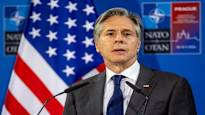The background of the policy change is Russia’s threatening advance in the Kharkiv area.
Vilma Romsi,
Mikko Leppänen,
Elsa Osipova
US Secretary of State Antony Blinken confirmed on Friday that the US has given Ukraine permission to strike with US weapons across the border into Russia.
Blinken spoke about it at a press conference in the Czech Republic after a meeting of foreign ministers of the military alliance NATO.
Blinken said that the president Joe Biden had given his approval for the use of weapons to prevent Russian attacks on the Kharkiv region.
This is the second time this year that Biden has tended to loosen the US’s arms aid policy to Ukraine. Last time, Biden agreed to send long-range ATACMS missiles to Ukraine.
According to media reports, the United States will not allow ATACMS systems or other long-range weapons to be used in attacks against Russia.
Germany has also changed its position on restrictions on the use of its weapons in Russian territory. The German government said on Friday that it had given Ukraine permission to attack the border area on the Russian side with weapons supplied by Germany.
– Together, we are convinced that Ukraine has the right guaranteed by international law to defend itself against attacks, the government spokesman says in the press release.
In the video below, President Alexander Stubb comments on the change of direction between the United States and Germany:
The situation in Kharkiv behind the decisions
Western countries have been divided on whether Ukraine is allowed to use Western arms aid for attacks against Russia on Russian soil.
Sweden, the Netherlands, Finland, Estonia, France and Britain do not restrict the use of Western weapons, but Germany and the United States have previously opposed the use of Western weapons for attacks against Russia on Russian soil.
However, according to media reports, Ukraine has used the American Patriot system it received from Germany at least once against Russia on Russian soil.
According to Blinken, the US’s change of direction is based on adapting to the situation on the battlefield. The foreign minister says that the United States is now responding to the events in the Kharkiv region.
– During the last few weeks, Ukraine has asked us for permission to use the weapons we supplied to defend itself against these attacks. This includes defense against the forces that are concentrated on the Russian side of the border and attack Ukraine, says Blinken.
The capital of the Kharkiv region, the second largest city in Ukraine, Kharkiv is located 19 kilometers from the Russian border. Russia has accelerated its cross-border attacks on the region, and in addition, Russian troops have invaded the region.
Stoltenberg on Russian threats: Nothing new
Secretary General of NATO Jens Stoltenberg was rejected by the Russian president in connection with the meeting of foreign ministers of the military alliance Vladimir Putin threats that the use of Western weapons would escalate and expand the war.
– This is nothing new. The situation has long been that whenever NATO allies offer support to Ukraine, President Putin tries to threaten us, says Stoltenberg.
– As for the escalation – well, Russia has escalated the situation by attacking another state.
Stoltenberg also pointed out today that some NATO countries have never restricted how Ukraine can use the weapons they have donated.
Spokesman of the Russian Ministry of Foreign Affairs Maria Zakharova said that he considered Stoltenberg’s words to be evidence that the weapons of NATO countries have been used on Russian soil all along.
Chairman of the Defense Committee of the Duma Andrei Kartapolov said that Russia is responding to the situation “asymmetrically”. Vice President of the Security Council and former President Dmitry Medvedev intimidated as usual with nuclear weapons and world war.
Sources: Reuters, BBC, AFP
